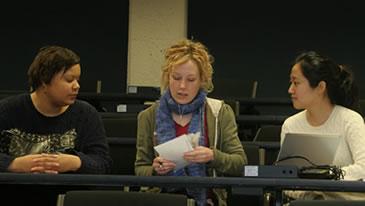The law school’s Pro Bono Program engages students in the delivery of legal assistance in cooperation with local attorneys and community agencies serving the poor and certain other groups, introduces students to the difficulties of the under-represented and the rewards of public service, encourages students after graduation from law school to discharge the lawyer's professional responsibility to render public interest service.
The Pro Bono Program also offers monthly community service opportunities such as building homes with Habitat for Humanity, serving lunch at a local soup kitchen, and planting a garden in the inner city of Cleveland.
Students who volunteer a minimum of 40 hours a year (in the course of one or more placements) are recognized at the College of Law annual awards ceremony.
Contact Clinical Law professor Pamela Daiker-Middaugh, LB 59c, 687-6878, for more information.

AWARDS AND FELLOWSHIPS
Pro Bono Service Award
Students who volunteer a minimum of 40 hours a year (in the course of one or more placements) are recognized at the College of Law annual awards ceremony and receive a certificate in honor of their community service. One student is selected each year to win the William A. Blair Memorial Service-Before-Self Award for outstanding community service.
Edith & Sidney Simon Civil Rights Fellow
One (1) law student will be named as a Simon Fellow. The student will receive a stipend of $1,600 for 160 hours of legal work at the Cleveland Office of the American Civil Liberties Union or another non-profit agency addressing issues of civil rights.
An applicant must submit his/her resume along with a letter detailing interest in civil rights, outlining past legal experience, and describing how the fellowship will impact his/her future legal career. If the applicant would like to work at another non-profit besides the ACLU, describe the organization and the work to be addressed.
David C. Weiner-Charna E. Sherman Community Service Fellow
One (1) law student will be named a David C. Weiner-Charna E. Sherman Community Service Fellow. The student will receive a stipend of $1,600 for 160 hours of legal work at a non-profit organization in Northeast Ohio during the summer.
An applicant must submit his/her resume along with a letter outlining the type of work the student hopes to undertake, a description of the non-profit organization—with the name of his/her supervisor (the applicant needs to have made that contact before applying for the fellowship)—and how the fellowship will impact his/her future career.
CSU College of Law Pro Bono Fellows
Four (4) law students will be named CSU College of Law Pro Bono Fellow. The students will each receive a stipend of $1,600 for 160 hours of legal work at a non-profit organization during the summer.
An applicant must submit his/her resume along with a letter outlining the type of work the student hopes to undertake, a description of the non-profit organization—with the name of his/her supervisor (the applicant needs to have made that contact before applying for the fellowship—and how the fellowship will impact his/her future career.
Dean’s Community Service Awards
Five (5) recipients will each receive $1,000 Awards.
An applicant must submit his/her resume along with a letter (maximum of five (5) pages) that describes your service to the community during the past five years, include dates and supervisors’ names, and service to the school (if applicable). Service to the community need not have been affiliated with the Pro Bono Program or the law school. Service may have been in another city or state. Service may have been legal, non-legal or both. Also, explain in detail how you think these experiences will impact your future professional life and how your commitment to the community will continue after graduation.
The awards are open to full- and part-time student who are in good standing and have completed at least one full year of law school.
Last edited by Admin on Tue, 02/23/2016 - 4:29pm
